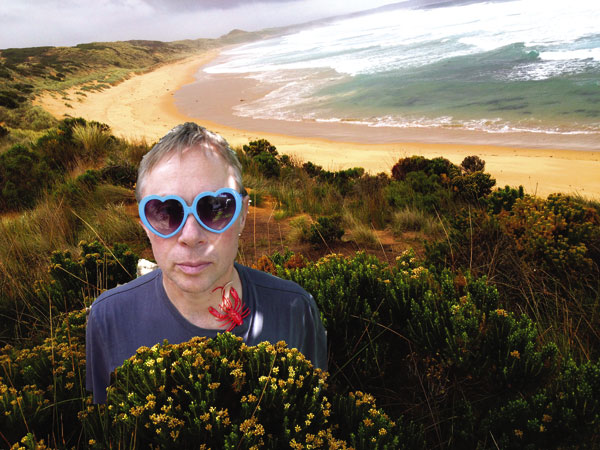
Legendary Australian musician Mick Turner has recently released Don’t Tell The Driver – a solo album that bears all of the marks of Turner’s highly creative stance, with a few new tricks thrown in for good measure. ALEX GRIFFIN gets the lowdown.
Unsurprisingly for someone who has been letting his guitar do the talking for over three decades now, Mick Turner isn’t the type to waste his words; on the phone, he takes long pauses while answering questions, long enough that by the time he picks up the thread of his response, I’m interrupting with a new question.
By the fourth time round, it’s nerve-wracking. As such, it might be surprising that his new solo album Don’t Tell The Driver sees him put words in the mouths of a wide supporting cast of musicians, with vocals abounding from a range of contributors. Opera singer Oliver Mann lends his profound pipes out of nowhere on Open Waves, and Caroline Kennedy-McCracken provides vocals on the title track, to beautiful effect.
To Turner, though, it’s nothing to get worked up about – it’s just things falling into place. “We’ve worked with vocals before in Dirty Three (Cat Power on Cinder, for example), so it wasn’t a completely new thing. I’m not the first person to decide to bring in a singer, and vocals are such a powerful instrument on the record. The songs needed vocals to help with the narrative.”
To listen through his resume is to pretty much run through the history of Australian rock music. With Fungus Brains he made ear-gouging punk, with the Moodists, some of Australia’s finest and weirdest post-punk, and over the course of two decades Dirty Three have redefined the boundaries of what people can do with guitar, violin and drums. Don’t Tell The Driver is his fourth solo record, and his best yet; a swirling gambol through tangled waves of melody and dreaming.
Yet, having come together over four years of woodshedding in between other commitments, working solo isn’t the easiest process for Turner. “In some ways it’s harder, because it’s difficult to make decisions on things when you’re working by yourself. It can help to have someone else throw in their two bob when you’re at a crossroads because things get decided then; you don’t have arguments with yourself so much. In Dirty Three, like every band, we have a lot of arguments.”
To hear Turner play the guitar is like watching a spider build a web around you. Bobby Gillespie of Primal Scream once described Turner’s guitar style as playing in ‘the way that stars are spaced out across the sky’. Yet, even after everything he’s accomplished with six strings, Turner is still excited about the possibilities of his instrument.
“Guitar is the most popular instrument ever, because it’s really expressive, especially when you compare it to a piano or something. You can just extend the sound so much. Aside for the voice, which always rests at the top, the guitar can do the most things, especially the electric guitar. It’s infinitely variable. Like, that guy Beirut, who seems to be anti-guitar; like, his shtick is that the guitar is overdone. I think he’s great that he’s doing that, but the guitar is popular because you just can’t express as much when you try to use a trumpet or a piano instead.”
Another dimension of Turner comes through the instantly recognizable paintings that adorn the covers of Dirty Three albums and his own solo records. The art for Ocean Songs and Whatever You Love, You Are are iconic, evocative images, but Don’t Tell The Driver might sport my favorite Turner painting yet; a yellow path fanned by verdant bush opens onto an endless beach, as a figure stands at the center, dwarfed by but strangely conjoined with the landscape. It puts you perfectly in the frame for the music to follow, which is something that naturally arises out of Turner’s approach.
“Most of the paintings that are used for artwork are chosen from things I’ve been doing at the same time as recording. They haven’t been particularly painted for the album cover. Since I’m working on them at the same time, my head is in the same space, so they’re naturally related, the same things are going on in my head.” Turner doesn’t have to talk about what he’s doing for it to work; the best thing to do is to sit back and watch.